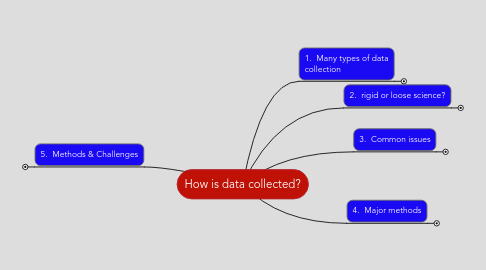
1. 5. Methods & Challenges
1.1. Comparative-Historical Methods
1.1.1. Comparison of different times or locations
1.1.2. Use findings of historians + archives
1.1.3. Develop innovative methods
1.1.4. Different kinds
1.1.4.1. regions/neighborhoods of one country
1.1.4.2. cross-national comparison
1.1.5. Ex: Weber - Protestant Ethic
1.1.5.1. Initial observation: Protestant regions economically advanced. WHY?
1.1.5.2. Linked religious beliefs to particular economic behaviors that resulted in wealth
1.1.5.3. In modern time, sociologists would be unlikely to believe ONE variable could be a sole cause
1.1.6. Ex: Skocpol - Revolutions
1.1.6.1. Why did similar situations sometimes but not always result in a revolution?
1.1.6.2. Three factors needed for revolution: govt crisis, internatl pressure, peasant revolts.
1.1.6.3. If only some factors present, revolution did not happen, according to Skocpol
1.1.7. Is the question settled?
1.1.7.1. Sociologists debate each question
1.1.7.2. Add new variables to consider
1.1.7.3. Look at different possible reasons
1.2. Statistical Methods
1.2.1. Causal inference
1.2.1.1. Correlation: things happen at same time
1.2.1.2. Causal inference: demonstrate one variable (or group of variables) is the cause of the other
1.2.1.3. Spurious relationship: two factors move together because of a THIRD factor that causes both.
1.2.1.4. Coleman Report: school resourced were not cause of poor test scores. There were OTHER factors.
1.2.1.5. Determining causality
1.2.1.5.1. Cross-sectional data: gathered at one point in time. Can't demonstrate change.
1.2.1.5.2. Longitudinal data: gathered across time. Necessary to demonstrate change.
1.3. Interview Methods
1.3.1. Survey: closed-ended forms
1.3.2. In-depth interviews (structured or unsctructured)
1.3.3. Life history / Oral history
1.3.4. Strengths and Weaknesses
1.3.4.1. Strength: captures the way the people make sense of their world (doesn't impose a view)
1.3.4.2. Challenge: How to develop the interview without prior knowledge of what to look for?
1.3.4.3. Challenge: What kind of sample to draw without knowing the important factors?
1.3.4.4. Challenge: Need to draw sample from those who actually experience phenomenon, but with random traits so as not to bias it
1.3.4.5. Ex: How to decide which single mothers to interview? How to locate them?
1.4. Ethnographic Methods
1.4.1. Not only who but WHAT kind of actions to observe
1.4.2. Challenge: trying to find patterns and make sense of the data.
1.4.3. Settings range from familiar to completely unknown
1.4.4. In sociology, most ethnography is in middle range of famliarity (vs anthropology)
1.4.5. Fieldwork: research in foreign cultures
1.4.6. Strength: Produces richest, nuanced account of social life
1.4.7. Strength: THICK descriptions
1.4.8. Strength: Able to uncover "practice" where words and actions collide and DIVERGE
1.4.9. Weakness: May lack analytical focus or ability to develop a theory
1.4.10. Weakness: Hard to generalize
1.4.11. Strength: Thick description may give insight into an aspect of life even without a theory
1.4.12. EXTENDED CASE METHOD: Ethnography with a focus on developing a theory
2. 1. Many types of data collection
2.1. surveys
2.2. data from other systems (school, courts, police etc)
2.3. in-depth interviews
2.4. participant observation
2.5. archives of past events
3. 2. rigid or loose science?
3.1. Scientific methods
3.1.1. process
3.1.1.1. formulate hypothesis
3.1.1.2. operationalize key variables
3.1.1.3. predict relationships
3.1.1.4. collect data from random sample
3.1.1.5. hold other variables constant
3.1.1.6. draw empirical generalizations
3.1.1.7. draw conceptual generalizations
3.2. "looser approach"
3.2.1. different stages
3.2.2. different order of stages
3.2.3. may not formulate formal hypothesis
3.2.4. may not be able to name or operationalize variables
3.2.5. opt to remain flexible
3.2.6. allow subjects and interview define issues
3.2.7. begin with several issues and refine later
3.2.8. may refine question even when research is in process
4. 3. Common issues
4.1. measurement
4.1.1. reliability
4.1.2. validity
4.2. sampling
4.2.1. what documents or groups?
4.2.2. probability sampling
4.2.3. random sampling
4.2.4. representative sampling
4.3. issues
4.3.1. types of data, eg demographic, opinion
4.3.2. do we have access to enough data?
4.3.3. Often work with what we can get
4.3.4. Data collection takes a LOT of time

